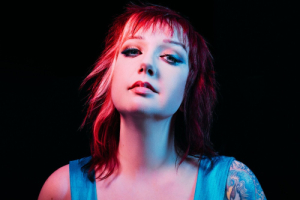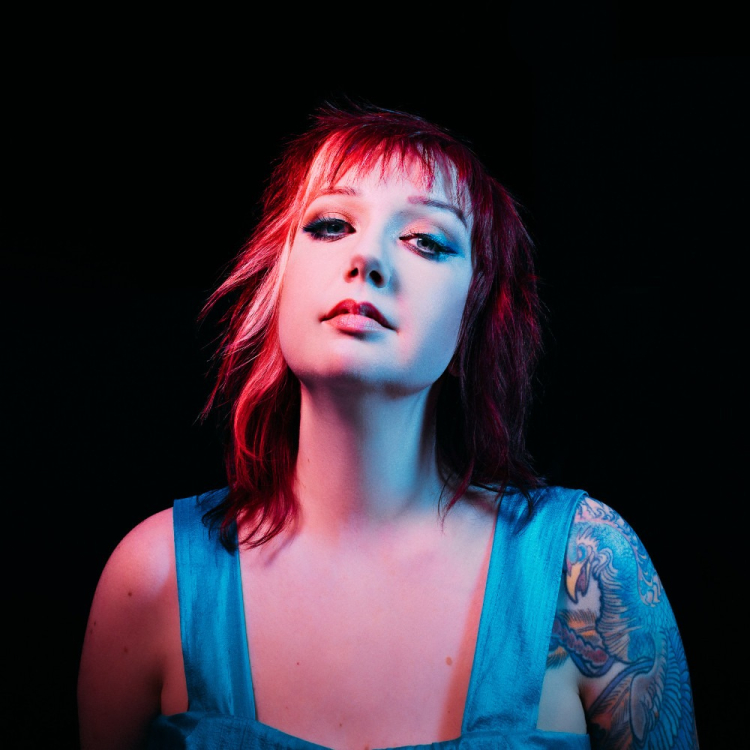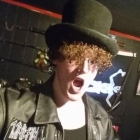
Hello Kat, thanks for being with us today. Let’s start with an intro. Tell our audience what you do, where you’re from, and what your favorite film of all time is and why.
Thanks for having me in. I’m a gothic electro-pop singer-songwriter and producer, currently based out of Vancouver, Canada. I make dark and moody synth-based tracks with lyrics based on my emotional struggles with trauma and pain and the strength found in healing from those things. My favourite film is a really hard one, because it depends on what kind of mood I’m in. I’m a huge fan of Jim Jarmusch’s Only Lovers Left Alive for its quiet depth and the untouchable performances by Tom Hiddleston and Tilda Swinton. But I also really love ridiculous escapism and find a not-so-guilty pleasure in the MCU.
And we’re just gonna rip the bandaid off right at the start. We reviewed your EP “Luna” and gave it a 5.5 out of 10. How important are reviews like this to you? Do you take them seriously? I also know that some artists just don’t care; that they do music for themselves and that’s that.
Music is so subjective, and it is physically impossible for everyone to love the same thing. I appreciate constructive criticism and often ask other artists I respect for feedback, but at the end of the day, my music is for me. I’m making what I want to hear, in a way that feels real and authentic to who I am and where my headspace is. I’m aware that what I create crosses some boundaries and blurs lines between genres. It’s also intensely personal, and I think because of those elements, it’s not for everyone, and there’s nothing wrong with that. As an artist you can’t take reviews, good, bad or otherwise too personally, because you run the risk of moving from creating from your soul, to creating for others, and then the art suffers.
And speaking of Luna, let’s jump into that subject. Let’s start with the cover art; a butterfly in front of a solar eclipse. What does that mean to you?
So, it’s actually a luna moth, not a butterfly. The moth is a scan of an ink drawing I did over the summer. The moth has become a really interesting signifier in my life, stemming from a dream I had a few years ago where my apartment was filled with cobwebs and cocoons. As I started to clear away all the dust and webs, these bright blue moths and butterflies emerged and started flying all around me. Since then I’ve seen moths everywhere, both real moths and more unusual places such as someone’s jewellery on the bus, or the wallpaper on a TV show. When you look up the historic symbolism of moths they are about transition and change, as well as finding light in the darkness. Luna moths in particular, because of their distinct colouring, are also a symbol of unexpected beauty. I’ve been in a stage of major change in my personal life this past year, so the timing of this imagery entering my life felt really important and personal. I chose the eclipse as the background because I have felt like I am moving into a brighter phase of my life, coming out of the darkness and into something full of light. So, all of the symbolism in the art is about change, growth, movement and new phases.
I also read that in comparison to your previous album, “Luna” is quite brighter. Was there a change of thought from then to now that served as the catalyst for this approach?
I’ve been in the process of healing from trauma for a number of years now. When I wrote the songs on my album, Music for the End of the World, I was deep into coming to terms with my traumatic childhood experiences and the impact it had on me as an adult. By 2022, when I was writing the songs that would be on Luna, I had moved from being angry all of the time, into a healthier space of reclaiming my life, self-acceptance and major growth. I still love a huge bass-y synth, but I felt like I needed to acknowledge the brighter perspective I had worked so hard to earn, and these five songs did that.
My favorite song on the album is ‘Blurry’ by far. What does this song mean as an individual piece?
Blurry is about transition. There is a weird, uncomfortable stage of growth where you aren't the fully developed new version of yourself yet, but you've outgrown the old self. Your edges feel a little blurry as they shift from who you were to who you are now. The lyrics specifically speak of a narcissistic abuser who had so much control over who I was as a child. Freeing myself from her control, and her ideas of who I was meant to be, has the energy of an oncoming storm obliterating any kind of sky that she wanted. The main lyric of “You claim to be the sun, but I’m the rain” is a poetic way of claiming space. Sonically it all started with the intro swell, which is a reversed organ chord with a bunch of reverb and effects. It had this discordant kind of energy that really seemed to capture the feelings of being stuck between the past and the future.
In comparison to the rest of the album, ‘Armour’ is quite fierce. What does this represent?
I call Armour my anthem for reclaiming the light. I wrote it in response to some of the feedback for my album, Music for the End of the World, where a few people expressed concern for my mental health. Which was very kind, but at that point I had done so much healing and processing while writing and recording that album that I was in a much better place than it appeared.
There's a bit of defiance in Armour, because I think when people see someone going through something, or working to heal from trauma, there is an impulse to protect and shield. In my experience though, people who are facing their trauma are likely some of the strongest people you'll ever meet.

One thing that I did note about your project is that you list Doris Day as a huge inspiration of yours. I find that odd, considering most electronic musicians cite other electronic composers as influences. Where did you find your love for Day and how has she inspired you?
I use electronic instruments and effects to create my music, but my musical tastes are really diverse. I feel like only drawing inspiration from the genre you’re in is like choosing one colour in a rainbow and ignoring the rest. I do have more expected inspirations listed in my bio, such as Imogen Heap and Nils Frahm, but artistically I’m more interested in ideas, innovation and emotion more than any specific style or genre. I could also add Philip Glass and Prokofiev to the list for that reason. I love Doris specifically for the same reason that I love Nina Simone and Ella Fitzgerald. These are women that were able to not just sing songs, but really pull out all of the emotion in every word. There is a timeless quality to Doris’s voice that I find really inspiring and something that I aspire to every time I sing.
And what does the near future hold in store for your project? Live shows so on and so forth? Anything else you’re working on?
As I write this I am in the final stages of preparing for my first international tour. I’m heading to the UK from Sept 15 - Oct 1 where I’m playing with some incredible local acts including AnalogueTrash label mates Vieon, Flange Circus, Debris Discs and Spray, but also some new friends like Soft Riot, Thomas Ragsdale/Sulk Rooms, Freequeensea and others. I’m really excited, as it’s the first time I’ll be playing outside of Canada, and the first big push with the material from Luna and Music for the End of the World. I haven’t really thought beyond October to be honest, but I’m open to whatever the next adventure is.
Lastly, I’d like to thank you for your time. I leave the space open to you to say anything I may have missed.
Thanks for the chance to talk about my music and what I’m doing. I hope that my words have given a bit more context to my work and where I’m coming from, and that they inspire some people to give my songs a listen.

Steven Gullotta
info@brutalresonance.comI've been writing for Brutal Resonance since November of 2012 and now serve as the editor-in-chief. I love the dark electronic underground and usually have too much to listen to at once but I love it. I am also an editor at Aggressive Deprivation, a digital/physical magazine since March of 2016. I support the scene as much as I can from my humble laptop.
Share this interview
Facebook
Twitter
Google+
Shares
Popular interviews
Psyclon Nine
Interview, Mar 24 2017
Night Runner
Interview, Oct 13 2016
Testube
Interview, Apr 02 2022
Kite
Interview, Feb 10 2017
God Destruction
Interview, May 17 2016
Related articles
Kat Bryan - 'Luna'
Review, Sep 03 2023
Mondträume - 'Life is short EP'
Review, Jun 15 2014
Vanguard - 'Sanctuary'
Review, Aug 13 2012
Machinista - 'Xenoglossy'
Review, May 07 2014
Empathy Test
Interview, Nov 14 2017



